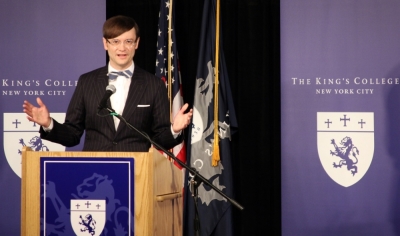The Christian Heritage of American Higher Education – Lost or Reborn?
Several Christian college leaders agreed with a recent op-ed by Arizona Christian University's president that reminded readers about the Christian heritage of the oldest and most prestigious schools in the United States, which were founded as Christian seminaries, but have since lost their faith tradition.
"Regardless of denomination, from the beginning, American colleges were founded to inculcate a religious culture," said Dr. David Whalen, provost and professor of English at Hillsdale College, in a Thursday interview with The Christian Post, agreeing with Arizona Christian University's Len Munsil.
Munsil wrote in an op-ed posted Wednesday in The Huffington Post about the Christian heritage literally etched in stone at Harvard, Yale, Princeton, and Amherst. "The consistent connection between these academically prestigious universities is the strong foundation each had in Jesus Christ and in preparing Christian leaders for service in the world," he wrote.
Today, however, "all have departed from that heritage," Munsil lamented. "It seems few Americans today understand that heritage, and how the influence of Christianity and biblical literacy was at the core of developing a prosperous and free nation." A majority of the founders may have been Christian, but the majority of today's college professors are not.

Gregory Alan Thornbury, president-elect of the King's College in New York City, explained the loss of faith. "I think the big headline for this should be 'Mugged by the Enlightenment,'" he said, lightly.
He traced the secularization of universities back to 18th Century German Philosopher Immanuel Kant. "Kant severed fact from value," Thornbury explained. Religion and ethics lie outside the realm of human experience, "What we have access to on terra firma is the world of appearances." Science alone may be trusted.
From this philosophy, faith became marginalized. Thornbury described "this 'two spheres' view of knowledge," where scientific "facts" are derived from reason and science, while abstract "values" must come from faith alone. This made faith both private and meaningless.
He referenced The Dying of the Light by James Tunstead Burtchaell, which traces the history of 17 different institutions and "how they lost their Christian mission and commitment."
During the 1900s, universities that had been funded by Christian churches and denominations "had to de-emphasize the denominational connection in order to bring more people with financial resources on board," he explained. Slowly, Boards of Trustees began to focus less and less on the faith.
Their influence spread to campus life, where chapel went from being required to being an option to being extremely marginalized.
While the original universities "were founded for an educated clergy, everyone else was viewed as part of a trade," said Thornbury.
Today, by contrast, "we don't know what higher education is for except that there is general agreement that there is some connection to higher wage earning," Whalen explained. In actual fact, however, "higher education has very little to do with what people end up doing in the world," mainly because most workers change careers "time after time after time."
Furthermore, this purpose and the traditional focus of higher education do not fit together. Colleges originally aimed at "the edification of the human person to understand the world and reality" both intellectually and morally, "so as to lead a good life." College taught both truth and moral goodness in order to cultivate true character.
To mix this almost spiritual goal with vocational training, Whalen argued, is like restricting all eating to a hospital. If everyone was forced to go to a hospital to eat "that would muddy up the whole healing" of the actual patients. Whenever you have "two different functions saddled on the same institution, there's going to be confusion."
Whalen predicted a great loss and a great branching out in American higher education. While "financial constraints are going to shove marginal institutions over a cliff," the prestigious colleges "will become almost entirely vocational."
But, like the Jews in Revelation, "there will be a remnant of elite institutions that focus on that humane learning because humanity…will persist on asking ultimate and serious questions," said Whalen. While Hillsdale, clearly part of this "remnant," is no longer a "Christian College," it boasts a majority of Bible-believing students and professors. Whalen himself is Roman Catholic, and says his faith undergirds his understanding of liberal education.
Thornbury proved more optimistic. "King's is about a reclamation project," he said. "It's the idea that there are not two spheres of knowledge," that faith and reason can work together. From the heart of New York City, King's College preaches the gospel and attempts to revive the Christian center of American higher education.



























